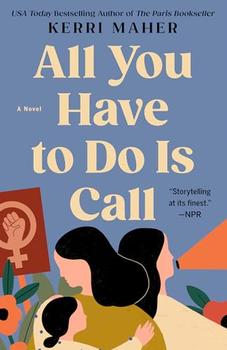Summary | Excerpt | Reading Guide | Reviews | Beyond the Book | Read-Alikes | Genres & Themes | Author Bio

This article relates to All You Have to Do Is Call
Kerri Maher's novel All You Have to Do Is Call fictionalizes the story of the real-life Jane Collective, an underground abortion network that operated in Chicago during the late 1960s and early '70s before abortion was legalized with the passing of Roe v. Wade in 1973. The organization was founded by Heather Booth, who as a college student in 1965 arranged a connection between a friend's sister who needed an abortion and the physician (and civil rights leader) T.R.M. Howard, who was able to perform the service. Booth and Howard continued working together to provide women with abortions, and this arrangement expanded into a larger system that became the Jane Collective.
The collective was run by volunteer activists, called Janes. As abortions were illegal, frequently dangerous and surrounded by a harsh stigma, those seeking them often had questions and fears. The Jane Collective not only put people needing abortions in touch with physicians, but provided counseling and support to help them through the experience. The Janes also eventually began offering abortion services themselves. Martha Scott, who was a member of the group, stresses the importance of experience in performing the procedure while also demystifying it: "Abortion is exactly like any other medical procedure. It's the decision that's an issue — the doing is very straightforward. This was something a competent, trained person could do." During the years the group was active, they facilitated or performed more than 11,000 abortions.
The 1970 legalization of abortion in four states — New York, Alaska, Hawaii and Washington — marked an increase in overall access to the procedure, but also created a gap between who could legally receive the sometimes lifesaving service and who couldn't. Many of those who could afford the trip to a state where abortion was legal from elsewhere were middle-class white women, and many of those who couldn't were poorer women of color. The Janes' illegal services remained critical in Illinois for people without the means to travel to New York, particularly because the collective priced their services based on what someone was able to pay. Most of the organization's volunteers were themselves white women, with some exceptions being Black members Marie Leaner, who allowed her home to be used for abortions and is still an advocate for women's health and other social justice causes, and Sakinah Ahad Shannon, who was also involved in a group that organized Freedom Rides and the March on Washington, and who went on to open her own abortion clinics in Chicago with her family.
In 1972, some Janes were caught providing abortion services by police at a South Shore apartment where they were in between procedures. Seven members total were arrested. A number of the women who had been present at the apartment on the day of the arrests refused to testify against the Janes. This didn't stop the members from being charged with abortion-related crimes and facing the possibility of a 110-year sentence each, but before they were brought to trial, Roe v. Wade passed and the case against them was dropped.
The reversal of Roe v. Wade in June of 2022, and the subsequent outlawing of abortion in some states, has made the work of past underground abortion networks relevant once again as today's equivalent organizations attempt to improve access under similar but somewhat different circumstances — now often via self-administered abortion pills. In addition to reading Maher's book, those interested in learning more about the Jane Collective can seek out the 2022 HBO documentary The Janes, produced by Daniel Arcana, whose mother Judith was one of the seven Janes arrested in 1972. Judith Arcana herself is the author of many poems, essays and books, some of which recount her experience working in the collective. You can also find more fiction highlighting reproductive rights in our reading list of novels that touch on the subject.
Filed under People, Eras & Events
![]() This article relates to All You Have to Do Is Call.
It first ran in the October 18, 2023
issue of BookBrowse Recommends.
This article relates to All You Have to Do Is Call.
It first ran in the October 18, 2023
issue of BookBrowse Recommends.
Your guide toexceptional books
BookBrowse seeks out and recommends the best in contemporary fiction and nonfiction—books that not only engage and entertain but also deepen our understanding of ourselves and the world around us.